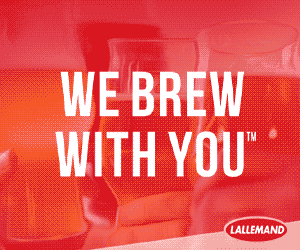JC’s Roggenbier
JC’s Roggenbier
(5 gallons/19 L, all-grain)
OG = 1.054 (13.4 °P) FG = 1.014 (3.6 °P)
IBU = 17 SRM = 16 ABV = 5.3%
After tasting JC’s roggenbier, I asked him for some tips and he generously shared his recipe, as all great brewers are willing to do. The recipe below is a slightly simplified version of his and makes an excellent roggenbier.
Ingredients
6 lb. (2.72 kg) Dingemans or Briess rye malt (3.5 °L)
2.75 lb. (1.25 kg) Durst or Weyermann Pilsner malt (1.8 °L)
2.75 lb. (1.25 kg) Durst or Weyermann Munich malt (8 °L)
0.9 lb. (408 g) Weyermann Caramunich® III malt (60 °L)
2 oz. (57 g) Weyermann Carafa® Special II (430 °L)
3.32 AAU Tettnang pellet hops (60 min.) (0.83 oz./24 g at 4% alpha acids)
0.875 AAU Czech Saaz pellet hops (15 min.) (0.25 oz./7 g at 3.5% alpha acids)
Wyeast 3068 (Weihenstephan Weizen) or White Labs WLP300 (Hefeweizen Ale) or Lallemand Munich Classic yeast
Step by Step
Mill the grains and dough-in targeting a mash of around 1.5 quarts of water to 1 pound of grain (a liquor-to-grist ratio of about 3:1 by weight) and a temperature of 154 °F (68 °C). Hold the mash at 154 °F (68 °C) until enzymatic conversion is complete. Infuse the mash with near boiling water while stirring or with a recirculating mash system raise the temperature to mash out at 168 °F (76 °C). Sparge slowly with 170 °F (77 °C) water, collecting wort until the pre-boil kettle volume is around 6.5 gallons (24.4 L) and the gravity is 1.042 (10.5 °P).
The total wort boil time is 90 minutes, which helps reduce the S-methyl methionine (SMM) present in the lightly kilned Pilsner malt and results in less DMS (dimethyl sulfide) in the finished beer. Add the bittering hops with 60 minutes remaining in the boil. Add Irish moss or other kettle finings and the last hop addition with 15 minutes left in the boil. Chill the wort rapidly to 62 °F (17 °C), let the break material settle, rack to the fermenter, pitch the yeast and aerate thoroughly.
Ferment at 62 °F (17 °C) until the yeast drops clear. With healthy yeast, fermentation should be complete in a week, but don’t rush it. The cooler than average ale fermentation temperature can extend the time it takes for the beer to attenuate fully. Rack to a keg and force carbonate or rack to a bottling bucket, add priming sugar, and bottle. Target a carbonation level of 2.5 to 3 volumes.
Partial Mash Option:
The Munich and Pilsner malts get replaced with 3.8 lb (1.72 kg) of a Munich extract blend (50/50 or 60/40 is fine). The rye malt needs to be converted via a mash. Crush the rye and other grains and place crush grains in a steeping bag. Heat 10 quarts (~ 9.5 L) to 160 °F (71 °C), add grain bag, and let steep for approximately one hour. Rinse out the grains and proceed as normal, adding the extract and water to the steeping liquor.
Written by Jamil Zainasheff

Jamil Zainasheff states, “After tasting JC’s roggenbier, I asked him for some tips and he generously shared his recipe, as all great brewers are willing to do. This recipe is a slightly simplified version of his and makes an excellent roggenbier.”



